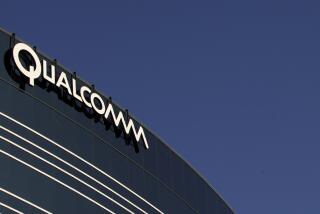Apple may stop using Qualcomm chips in iPhones; Qualcomm’s shares tumble

Reuters reports Apple has designed iPhones and iPads that would drop chips supplied by Qualcomm Incorporated.
- Share via
Qualcomm Inc. shares tumbled Tuesday after a report that Apple Inc. is considering dumping the company’s cellular modem chips from next year’s versions of iPhones and iPads.
The Wall Street Journal cited two unnamed sources saying Apple was designing devices to exclude Qualcomm chips that link smartphones to cellular networks as the two tech giants fight a fierce legal battle over Qualcomm’s patent royalties.
The report said Apple could use Intel or possibly MediaTek as alternatives to Qualcomm in devices that probably would roll out in late 2018 based on past iPhone product cycles.
According to analysts, Apple typically makes component supply decisions for the next iPhone version nine months or so ahead of time, though that’s not always the case.
Shares of San Diego-based Qualcomm dropped 6.7% on Tuesday to $51.01.
Apple and Qualcomm are locked in a legal battle over Qualcomm’s patent-licensing business model.
Apple, which has stopped paying Qualcomm for use of its intellectual property during the dispute, contends that charging royalties based on a percentage of the total device price means Qualcomm gets paid for inventions it had nothing to do with.
Qualcomm counters that cellular technology — particularly high-speed wireless internet access — is what makes smartphones smart. Analysts estimate that Apple was paying roughly $10 per iPhone in royalties for use of Qualcomm’s cellular patent portfolio.
Qualcomm has two businesses. It sells many chips used in smartphones — including modems that link smartphones to cellular towers — and it licenses its portfolio of smartphone patents to device-makers.
Qualcomm has been supplying modem chips to Apple since 2011. It was the only supplier until last year, when Apple began using Intel modems in roughly half its iPhone 7 models.
The Wall Street Journal said Qualcomm withheld testing software from Apple for iPhone and iPad prototypes, which led Apple to begin designing devices without Qualcomm modems. Asked about that assertion, Qualcomm released a statement saying that “the Qualcomm modem that could be used in the next generation iPhone has already been fully tested and released to Apple. We are committed to supporting Apple’s new devices consistent with our support of all others in the industry.”
Stacy Rasgon, an analyst with Bernstein Research, estimated in a research note that Qualcomm’s modem sales to Apple range from about $1.5 billion to $2 billion a year — roughly 10% of annual revenue.
“We wouldn’t expect the Apple case to go to court for at least a year if not longer,” he wrote. “While we are unsure either party really wants to go in front of a jury we certainly don’t see Apple with any real incentive to settle anytime soon, and current news-flow does not suggest a softening of feelings.”
Rasgon noted that Intel modems currently don’t support a 3G technology called coded-division multiple access, or CDMA, which is required by Verizon, Sprint, Chinese wireless network operators and others.
Next year, Intel is expected to support CDMA technology in its modem chips, which would open the door for Apple to exclude Qualcomm as a supplier.
Still, Qualcomm’s modems are faster — at least for now. Its current modems powering Samsung, Sony and other top Android smartphones can deliver peak download speeds of one gigabit per second.
Intel’s current LTE modem delivers peak speeds of 600 megabits per second. Analysts have suggested that Apple throttled the capabilities of Qualcomm modems in iPhone 7 models sold on Verizon and Sprint so they didn’t exceed the speeds of Intel-powered iPhone 7s sold on AT&T and T-Mobile and in Europe.
Dropping Qualcomm as a supplier may carry risks for Apple. In an interview in August, Canaccord Genuity analyst Mike Walkley said Qualcomm has been working on next-generation 5G technology for a decade. Intel and other competitors also are working on 5G, but Walkley noted that when 4G first rolled out in 2010, Qualcomm was the only company producing working 4G modems. It took four years for competitors to catch up.
Qualcomm expects its 5G chips — which aim to deliver speeds of 5 gigabits per second — to be ready for smartphones in 2019. It recently completed lab tests on its first miniaturized 5G cellular modem using millimeter wave airwaves.
“Apple needs Qualcomm when 5G comes,” Walkley said. “5G is going to be even more complicated than 4G.”
Freeman writes for the San Diego Union-Tribune.
mike.freeman@sduniontribune.com
UPDATES:
1:30 p.m.: This article was updated with Qualcomm shares’ closing price.
This article was originally published at 11:10 a.m.






